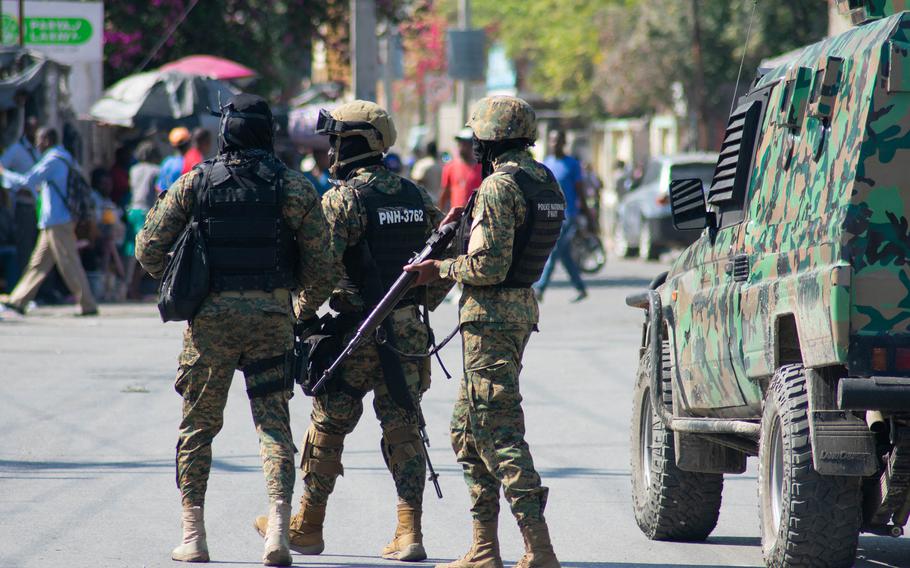
Haitian police officers deploy in Port-au-Prince, Haiti, on March 9, 2024. Sporadic gunfire rang out in Port-au-Prince late March 8, an AFP correspondent there heard, as residents desperately sought shelter amid the recent explosion of gang violence in the Haitian capital. (Clarens Siffroy, AFP/Getty Images/TNS)
(Tribune News Service) — The number of Haitians killed by criminal gangs in the first three months of this year has skyrocketed and armed gang violence remains the main driver of human-rights abuses in the volatile Caribbean country, a new United Nations human rights report said Thursday.
More than 1,500 Haitians have died at the hands of armed gangs, who continue to mount a deadly siege on Haiti’s capital. The alarming violence is exacerbating an already dire human rights situation, especially on children, according to the U.N. High Commission for Human Rights.
Children are getting caught in the crossfire and being killed during violent attacks, and are also increasingly used by gangs as lookouts for kidnappings or to carry out armed attacks.
“The situation of the violence on children is particularly worrying,” the report said.
Volker Türk, the U.N. high commissioner for human rights, said dealing with Haiti’s ongoing security issues “must be a top priority to protect the population and prevent further human suffering.”
The continued use of sexual violence by gangs to brutalize and control the population, the attacks on neighborhoods and the recruitment and abuse of children who are unable to leave gangs’ ranks for fear of retaliation, “are outrageous and must stop at once.”
The report covers the period between Sept. 25, 2023, and Feb. 29, the first day of the current siege. Through a series of deadly, coordinated attacks, a united front of armed gang leaders have targeted police stations, the main seaport and airports in Port-au-Prince, and orchestrated the release of thousands of inmates from the country’s two largest prisons. They’ve also set fire to schools, hospitals and pharmacies while expanding the violence into wealthy neighborhoods.
The large-scale attacks, while concentrated in the capital, have also spread to the Lower Artibonite Valley, just north of metropolitan Port-au-Prince. Gang violence has prevented the functioning of at least 10 hospitals and clinics, forced the closure of schools and is increasingly responsible for growing poverty in the rural community.
“Gangs in the Artibonite department have attacked farm properties and also stolen hundreds of livestock belonging to residents, assets which often represent farmers’ life savings,” the report said. “Furthermore, along the northern coast of the Arcahaie and Léogâne communes, the Village de Dieu gang continues to use motorboats to ... attack, loot, and steal from residents, local businesses, and humanitarian actors.
“To pay the ransoms demanded by gangs for the liberation of kidnapped family members, many have been forced to sell their homes and take out loans,” the report added. “Others have lost all their possessions and savings as they fled imminent gang attacks.”
Türk reiterated the need for the urgent deployment of a Multinational Security Support mission to help the Haiti National Police protect the public and restore the rule of law in the country. But he also underscored the need for any mission to take into account the highly complicated dynamics of gang violence in the country where many of the members are primarily young men and children.
“A particular focus should be placed on children involved in gangs-related criminality as well as women victims of sexual violence, in accordance with international human rights law and standards. Victims should also be supported to access justice and to file complaints,” the report said.
The report underscores that while the current wave of violence is alarming, it had been building for months. In August, the once peaceful neighborhood of Carrefour Feuilles, for example, came under attack and entire families were burned alive in their homes. Others were forced to flee.
In addition to being responsible for more than 4,400 deaths last year, gang violence also has resulted in the looting and destruction of more than 1,880 homes and businesses since January 2023, U.N. investigators said.
“Corruption, impunity and poor governance, compounded by increasing levels of gang violence, have eroded the rule of law and brought State institutions... close to collapse,” the report said. “The impact of generalized insecurity on the population is dire and deteriorating... and the population is severely deprived of enjoying its human rights.”
The report notes that while gang violence has intensified, so have efforts by self-defense brigades among the population to protect themselves by taking justice into their own hands. At least 528 cases of lynching were reported last year and already stand at 59 this year.
©2024 Miami Herald.
Visit miamiherald.com.
Distributed by Tribune Content Agency, LLC.